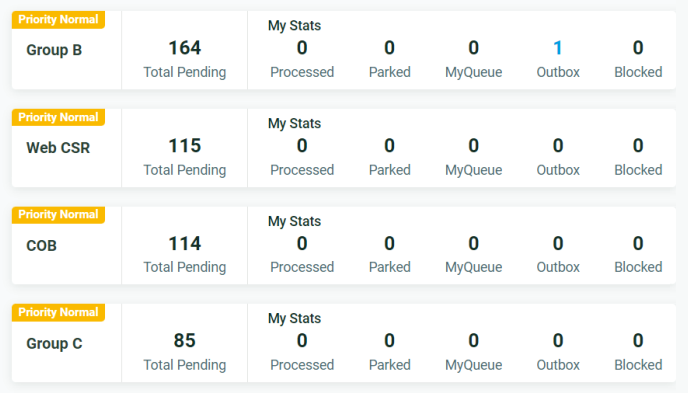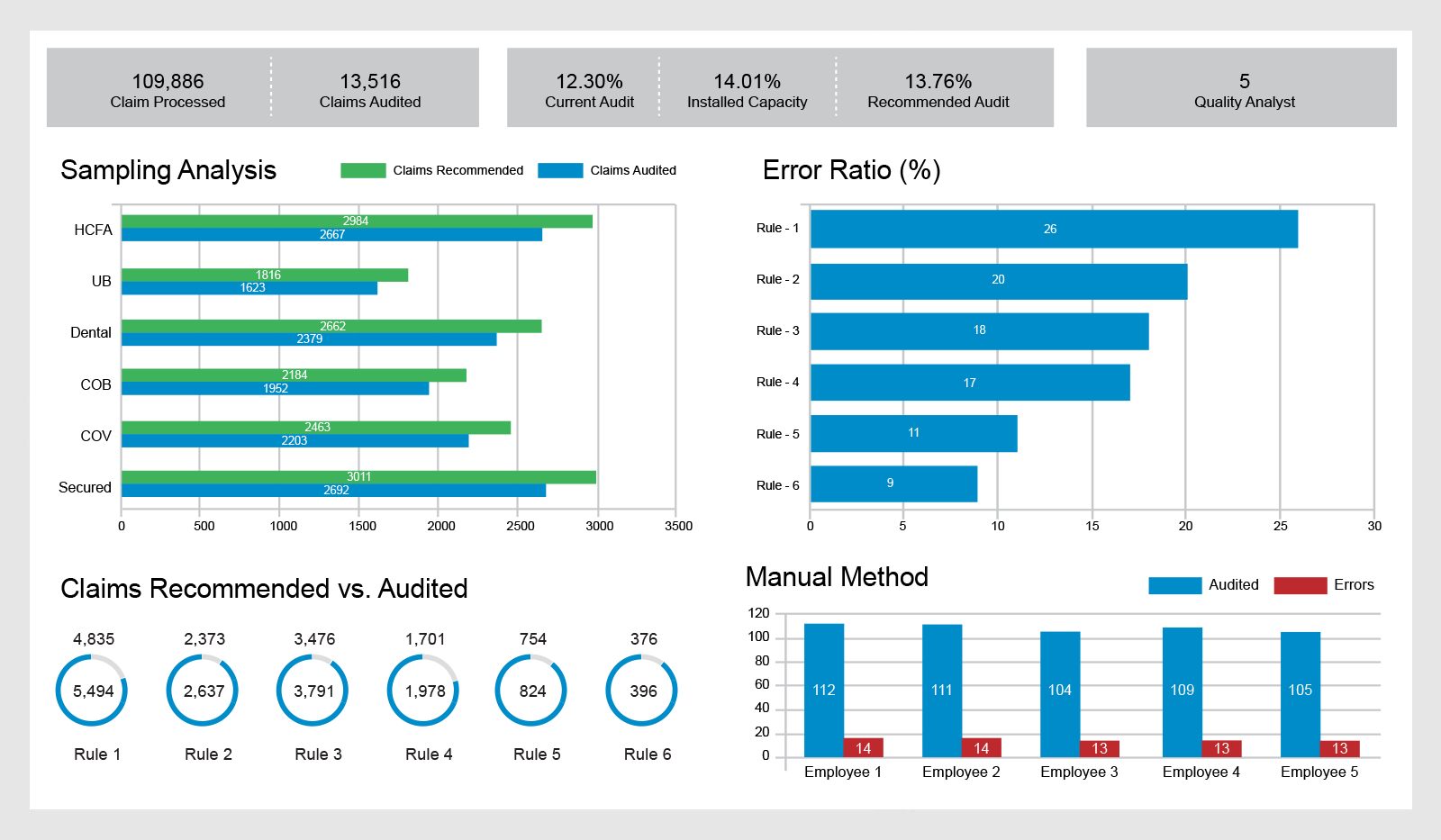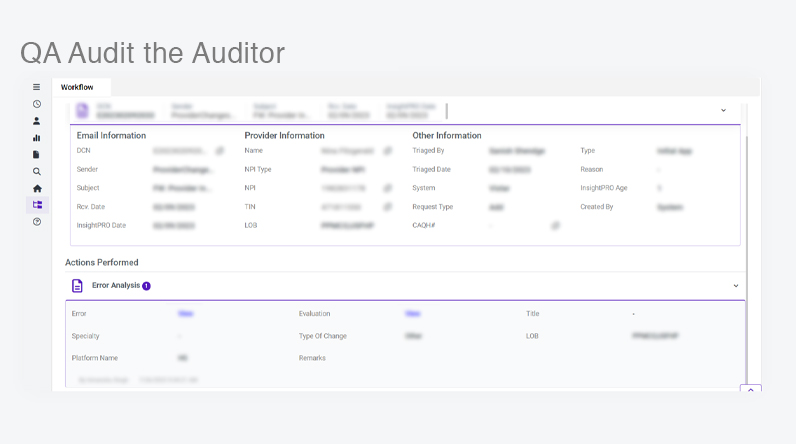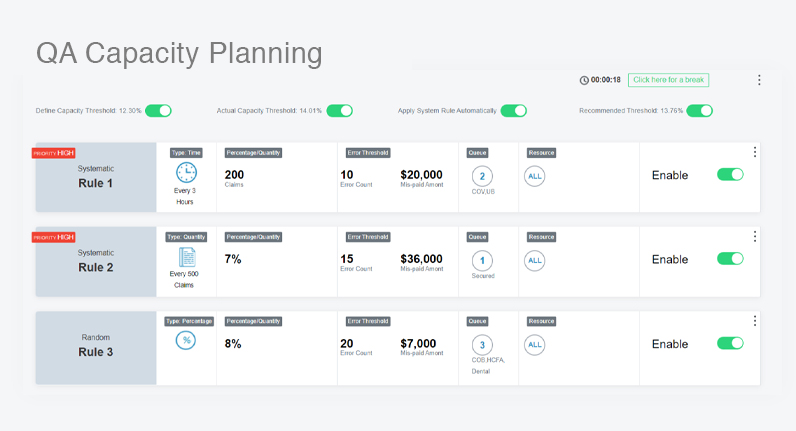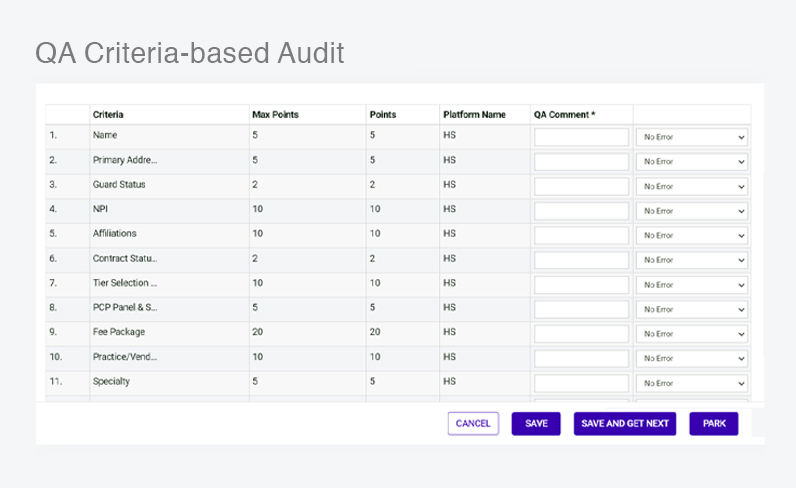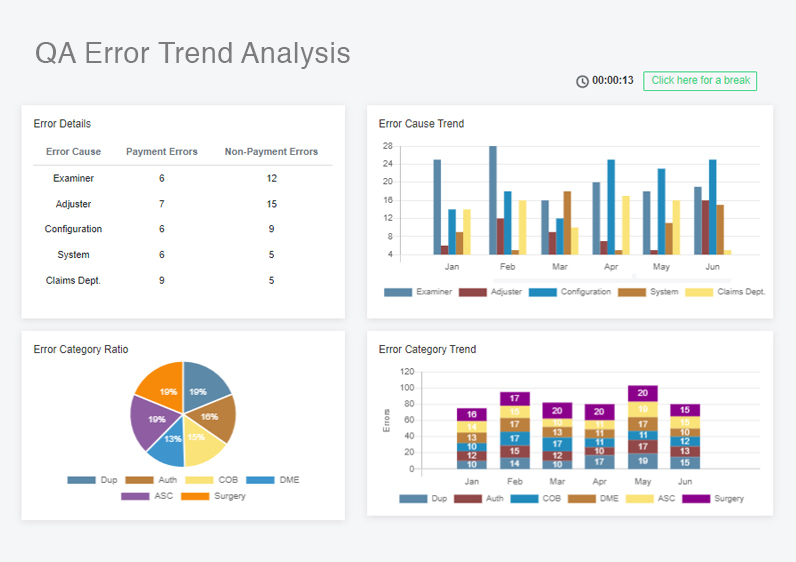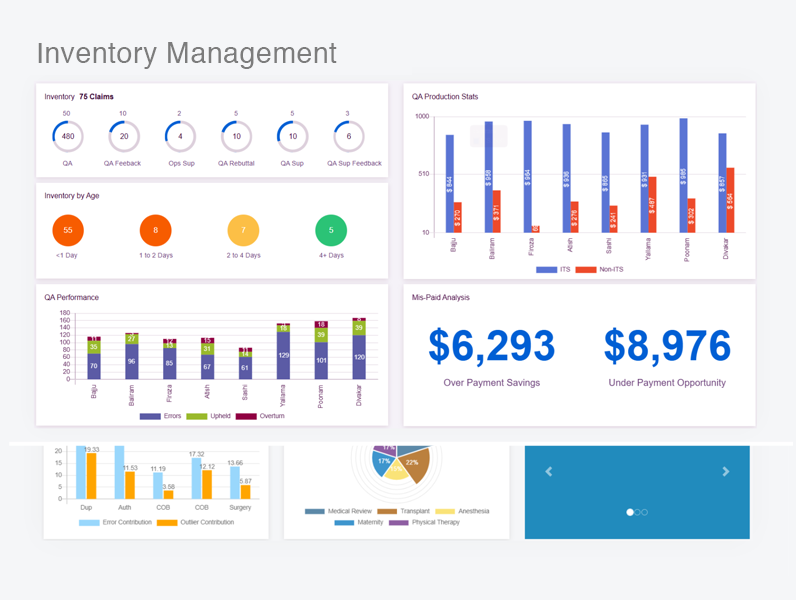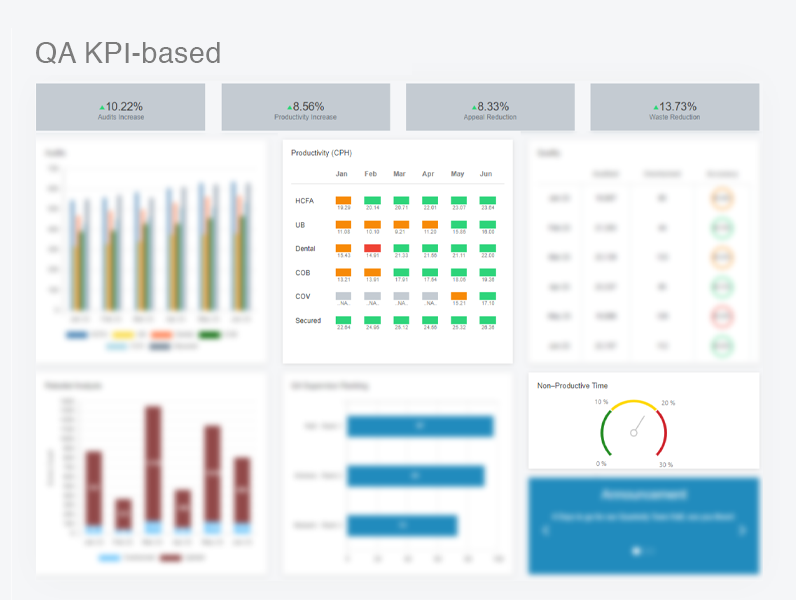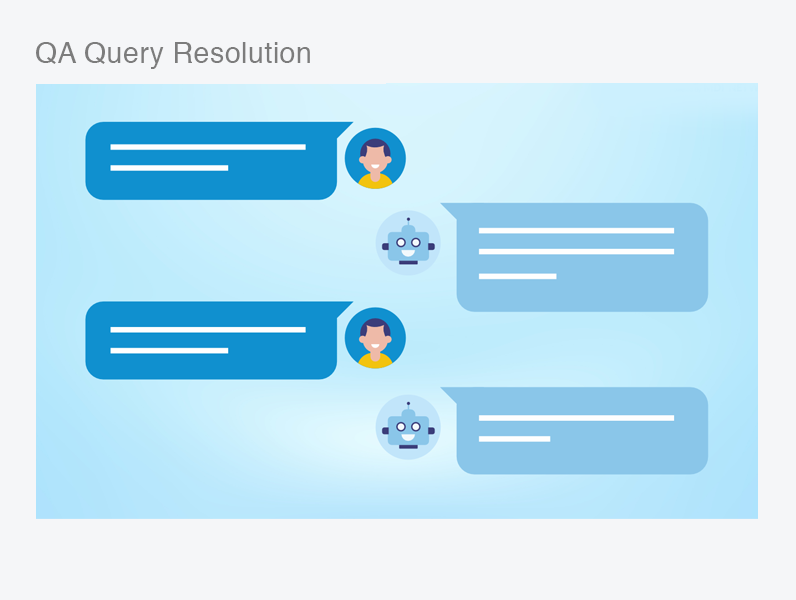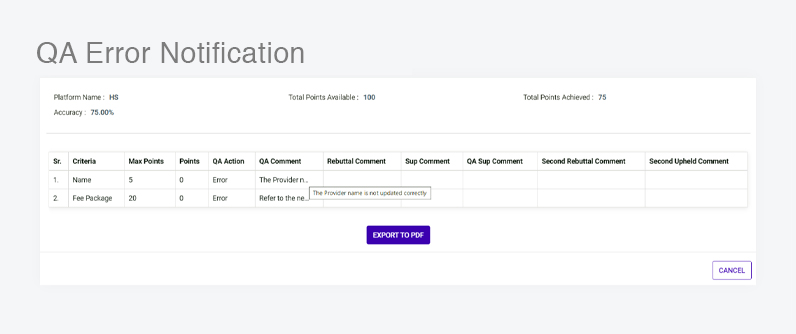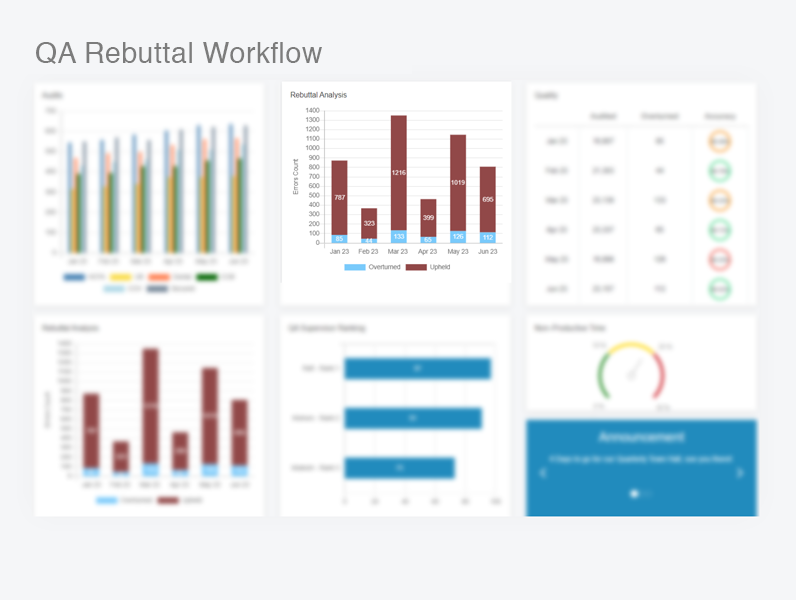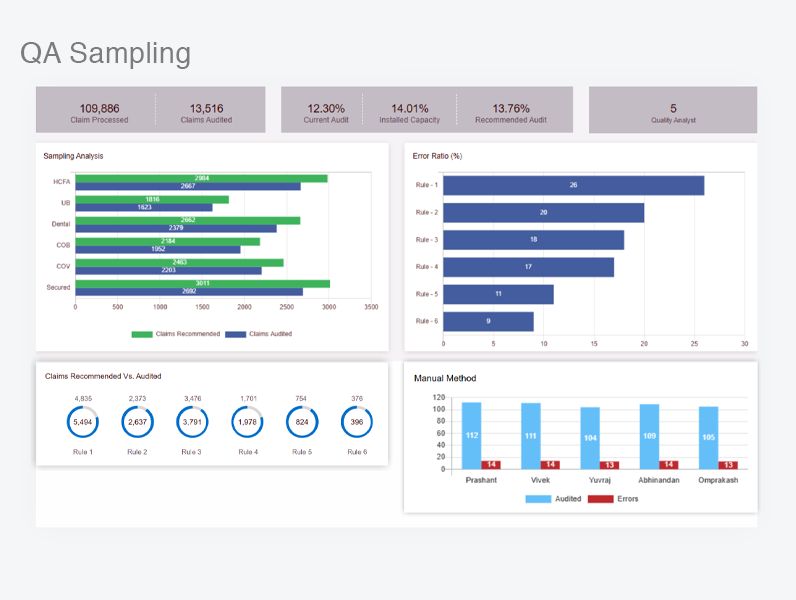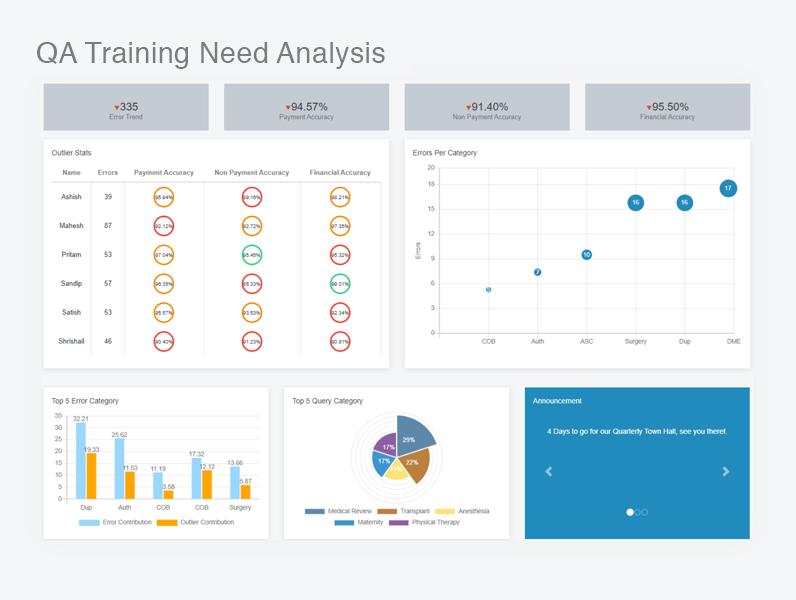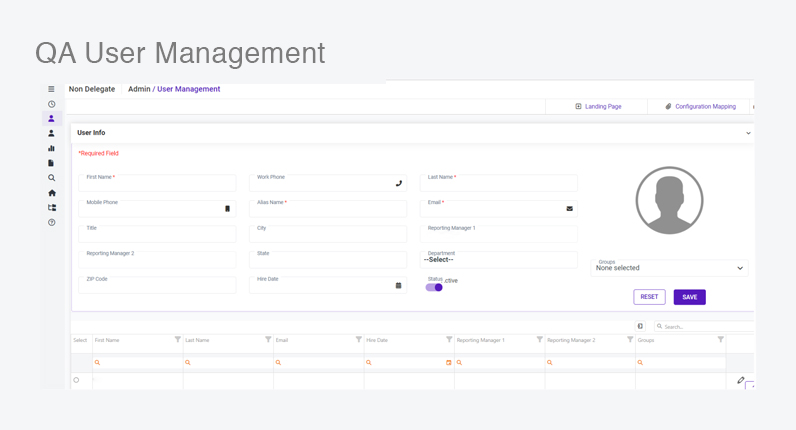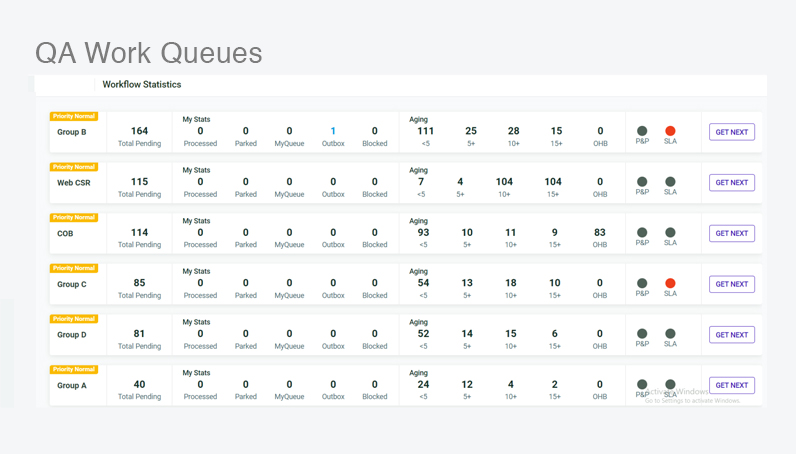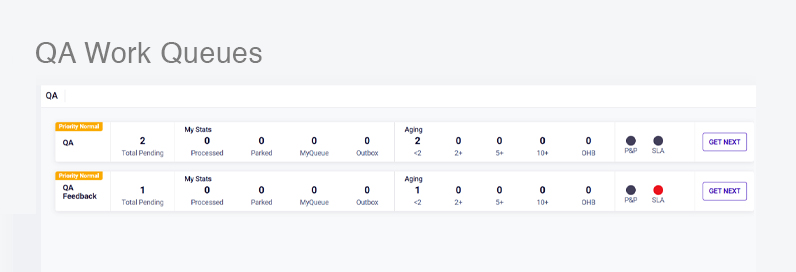QUALITY ASSURANCE MANAGEMENT
Our AI solution provides 30% faster rebuttals with 20% fewer errors for guaranteed quality assurance.
Quality Assurance Management
Stay ahead of the ever-changing healthcare landscape with these powerful, AI-driven quality assurance features of sampling, capacity planning, comprehensive auditing, rebuttal capabilities, error feedback, and more.
Audit the Auditor
InsightPro delivers a rigorous quality assessment process that involves conducting multiple levels of audits with crucial parameters incorporated at each stage.
Learn more

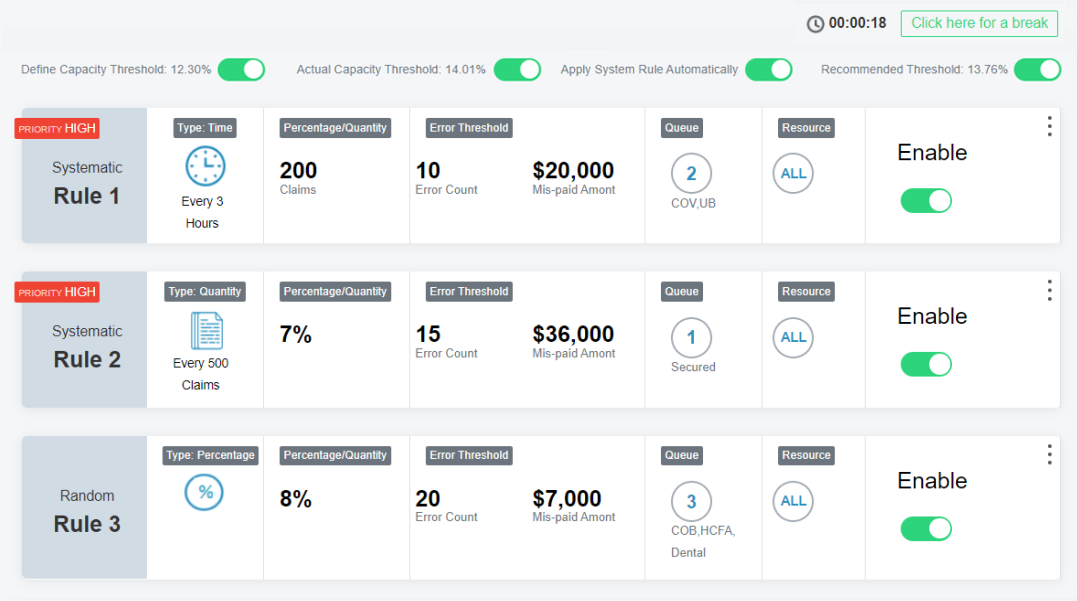
Capacity Planning
InsightPro utilizes an AI/ML-based capacity planning engine to empower users to optimize resource allocation, eradicate bottlenecks, and make well-timed decisions.
Learn more
Enhancing Healthcare Quality Assurance with AI-Driven Capacity Planning
Artificial intelligence (AI) technologies in healthcare quality assurance are transforming traditional approaches, shifting from static processes to agile, dynamic, and data-driven methodologies. With the ability to perform complex calculations on large data volumes, AI enables real-time decision-making and adaptive processes. AI-driven capacity planning, in particular, optimizes resource allocation during healthcare audits, enhancing accuracy, productivity, and efficiency. This shift empowers healthcare organizations to overcome operational challenges, embrace digital transformation, and achieve quality outcomes for members. Such methodologies pave the way for robust advancements driven by emerging trends in the industry.
Healthcare organizations globally are recognizing the need to move beyond outdated models of quality assurance. For instance, many still face inefficiencies in audit accuracy and workload management, which often lead to delays and inconsistencies. AI’s capacity to predict, adapt, and optimize processes offers a forward-thinking solution, bringing precision and agility to an industry that depends heavily on accuracy and timeliness.
AI in Healthcare Quality Assurance
AI plays a pivotal role in elevating healthcare quality assurance, particularly in managing workloads and resource planning. Traditional approaches often rely on manual inputs and scheduled tasks, which can result in inefficiencies and delayed insights. In contrast, AI-driven systems analyze vast datasets to predict variations in workloads and enable resource planning with precision. These systems anticipate audit demands, ensuring workloads are balanced and aligned with organizational goals.
For example, consider a healthcare organization that faces surges in audit requirements during regulatory review periods. With AI systems in place, this organization can predict such surges, redistribute resources effectively, and avoid bottlenecks that traditionally hinder audit timelines. AI’s predictive capabilities empower healthcare organizations to adjust auditor workloads based on historical data, real-time needs, and projected variations. This ensures resource allocation remains optimal during high-demand periods, reducing delays and avoiding errors.
By integrating machine learning and predictive analytics, healthcare organizations achieve efficiency in audits, improve quality outcomes, and align with broader digital transformation initiatives. Additionally, AI-enabled systems enhance the reliability of reported data by reducing errors caused by overworked auditors. By leveraging real-time analytics, organizations can redistribute resources dynamically, maintaining operational stability while improving the accuracy and consistency of audit results. This streamlined approach ensures a sustainable quality assurance framework that adapts to evolving industry demands.
Ensuring Consistent Audit Quality
AI-based systems facilitate consistent audit quality by aligning resource planning with organizational objectives. Continuous monitoring and analysis of key performance indicators (KPIs) enable organizations to identify deviations and implement corrective actions proactively. This ensures that quality standards are upheld across all audit engagements.
Predictive analytics further enhance audit quality by assessing potential impacts of deviations and suggesting preventive measures to mitigate risks. These capabilities foster an environment of continuous improvement, where organizations can maintain audit accuracy, deploy resources effectively, and enhance decision-making capabilities.
Real-world applications of AI in healthcare quality assurance demonstrate its transformative potential. For payer organizations, AI-powered capacity planning optimizes claims performance by analyzing large datasets, ensuring better decision-making. Hospitals benefit from AI-driven workflows that scale staffing needs dynamically, addressing fluctuating requirements with agility. Similarly, third-party administrators utilize AI to streamline operations, reduce operational costs, and deliver faster, more accurate outcomes. These advancements enable healthcare organizations to track resource utilization, manage changing demands efficiently, and create a culture of quality improvement.
Maximizing the Value of AI-Driven Capacity Planning
AI-driven capacity planning delivers tangible benefits to healthcare organizations, enhancing both efficiency and sustainability. By automating resource allocation, AI reduces auditor fatigue and ensures workloads remain balanced, leading to higher productivity and improved audit accuracy. Scalable AI systems also contribute to cost savings by eliminating inefficiencies and reallocating resources dynamically based on real-time data.
Additionally, these systems empower organizations to address barriers to effective auditing, such as workload imbalances and delays. By detecting potential bottlenecks and adjusting workflows in real-time, AI not only enhances operational efficiency but also supports auditor well-being. This dual focus on efficiency and sustainability ensures that healthcare organizations remain agile and prepared to meet the challenges of a rapidly evolving industry.
Consider an organization that has implemented AI-driven capacity planning to tackle fluctuating audit demands. During peak periods, AI allocates resources to critical areas, ensuring that workloads are balanced and audit outcomes remain accurate. The reduction in errors and delays directly impacts member satisfaction, reinforcing trust and reliability in the organization’s services.
Conclusion
AI-driven capacity planning is an indispensable component of modern healthcare quality assurance. By adopting a flexible and data-centric approach, organizations can improve the efficiency and accuracy of their audit processes while fostering a culture of continuous improvement. AI systems eliminate the need for manual projections, ensuring workload balance, preventing auditor exhaustion, and supporting high-quality audit delivery. Beyond immediate operational benefits, AI also offers strategic value through scalability, cost efficiency, and long-term sustainability.
Embracing AI-driven quality assurance equips healthcare organizations to address current challenges and prepare for future advancements. As the industry continues to evolve, such solutions will play a critical role in achieving operational excellence and delivering superior member outcomes, ultimately redefining the standards of healthcare quality assurance. By leveraging AI’s full potential, healthcare leaders can position their organizations at the forefront of innovation, driving impactful changes for years to come.
Capacity Planning
By analyzing vast amounts of historical data and current workload patterns, our tool makes recommendations for the appropriate audit percentages and rules. It then effectively aligns resource capacity with audit requirements for optimization. This not only drives operational efficiency and reduces costs, but also supports the pursuit of continuous quality and capacity planning excellence in auditing processes.
Criteria-based Audit
InsightPro redefines the concept of quality by configuring diverse audit criteria and calculating accuracy through a point-based system.
Learn more
Criteria-based Audit
Instead of the traditional pass/fail approach where samples are marked as either compliant or non-compliant, Criteria-based Audit is customizable and assigns points based on the degree of compliance with each criterion. By conducting audits at this granular level, errors are minimized and criterion is better aligned with specific quality objectives.

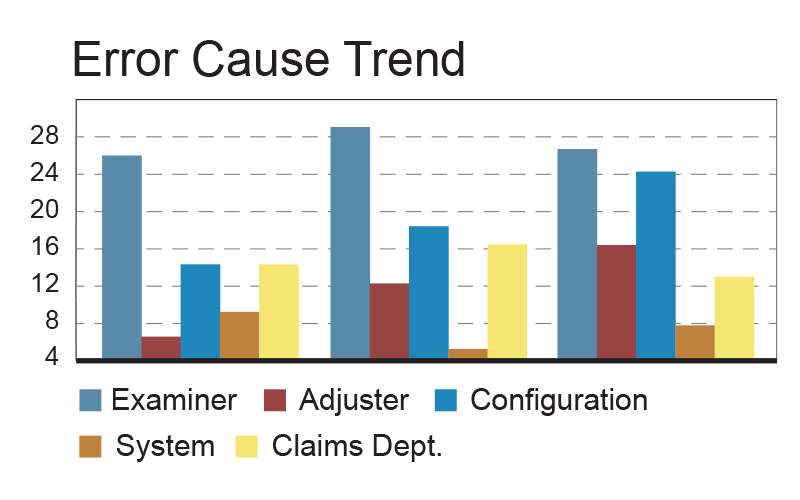
Error Trend Analysis
InsightPro leverages sophisticated algorithms to detect and analyze various error types, revealing root causes behind accuracy reductions and providing an informed perspective on operational challenges.
Learn more
Error Trend Analysis
Users are then strategically equipped to update guidelines, provide additional training, and/or implement new tools and technologies to mitigate these detected errors. By proactively addressing errors, users are ensured that service level agreements are consistently met or exceeded. Overall, this contributes to improved efficiency and customer satisfaction.
Inventory Management
InsightPro promotes effective inventory management comprised of essential components, such as the precise tracking of inventory, to guarantee optimal inventory levels.
Learn more

KPI-Based Dashboards
InsightPro enhances your processing efficiencies with this innovative, dual-action feature.
Learn more
KPI-based Dashboards
Executive Dashboards
Drive process efficiency, streamline operations, identify trends, and enhance overall performance through the insightful assessment of inventory, production, productivity, and accuracy reports.
Supervisor Dashboards
Pinpoint over or under-utilized individuals and teams in order to make adjustments for balancing workloads, addressing staffing concerns, and optimizing resources.
Personal Examiner Dashboards
Examine personal performance with insights pinpointing productivity and focus influencers that identify supportive and hindering aspects of practical work. Act upon suggestions for improvement in quality and accuracy of work.
Manager Insights (Team Productivity) Dashboards
Acquire insights into monthly productivity fluctuations among teams across diverse locations or processes, enabling optimized resource allocation and enhanced performance management.
InsightPro AI Assistant Efficiency Dashboards
Measuring the effectiveness of AI expertise in answering queries accurately and finalizing the queries sent to SMEs for resolution.
Process KPI Dashboards
Display health of processes and highlight outliers related to key KPIs – TAT, productivity, accuracy, volume, etc. This streamlines intricate decisions through prompt data analysis, effortlessly allowing users to oversee and improve process health with ease, strengthen forecasting and process management capabilities.
Productivity Dashboards
Get insights on the productivity trend for all your resources. This helps you manage the workload of teams, identifying the training and ramp-up plan needed for individuals and teams.
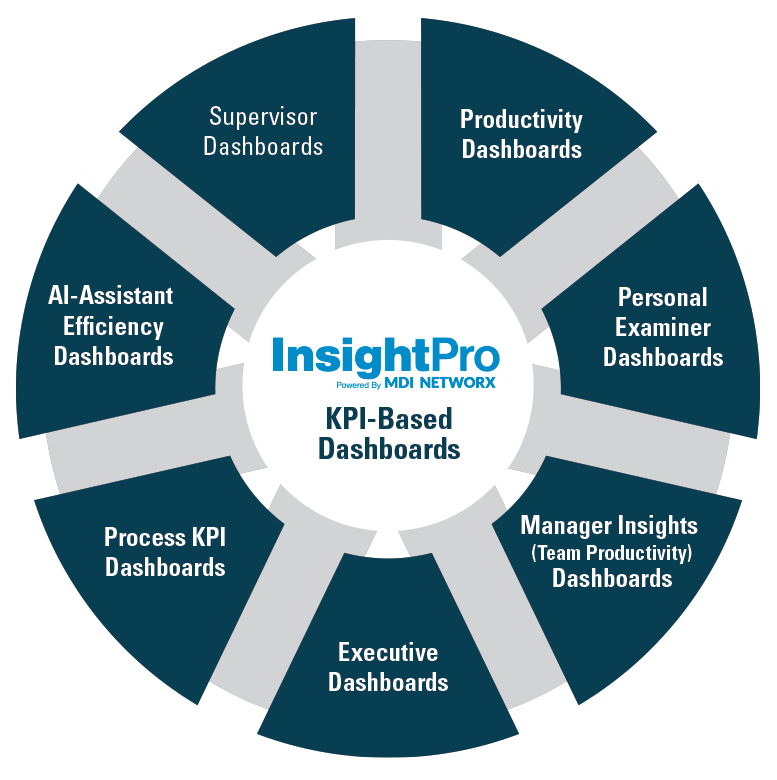
Query Resolution / SME Support
InsightPro empowers auditors with the cutting-edge capabilities of AI-driven Query Resolution and Subject Matter Expert (SME) to guarantee superior quality in resolving concerns and upholding seamless quality standards.
Learn more
Query Resolution / SME Support
Using a multi-level query resolution, immediate assistance is provided in order to handle inquiries quickly and reduce the workload of human experts. If these first-level inquiries cannot be resolved, they are swiftly handed off to the Subject Matter Experts. This system uses ongoing refinement through machine learning algorithms, resulting in the continual enhancement of the system’s ability to provide accurate query resolutions.

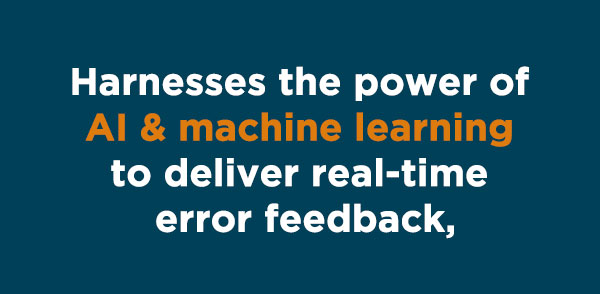
Real-time Error Feedback
InsightPro harnesses the power of AI and machine learning to deliver real-time error feedback to both examiners and auditors, indicating a new era in error detection and analysis.
Learn more
Real-time Error Feedback
Using automatic notifications and real-time feedback mechanisms, precision and accuracy are amplified throughout the auditing process like never before. The data collected through this real-time feedback is then analyzed to identify trends and patterns in error occurrence, driving continual improvements within your organization.
Rebuttal Management
InsightPro’s meticulously structured yet customizable rebuttal workflow effectively minimizes the time required for error resolution from weeks to hours, saving time for your Quality team.
Learn more

Sampling
InsightPro implements an automated system of diverse sampling methods including both random and stratified sampling techniques.
Learn more
Sampling
This automated sampling tool uses rules to focus on specific factors, refining operational efficiency and frameworks. Dashboards are provided to display a visual representation of sampling outcomes, showing efficient versus non-efficient sampling rules and techniques. This dynamic approach to sampling enables organizations to obtain targeted and optimal sampling data that is more accurate and compliant.
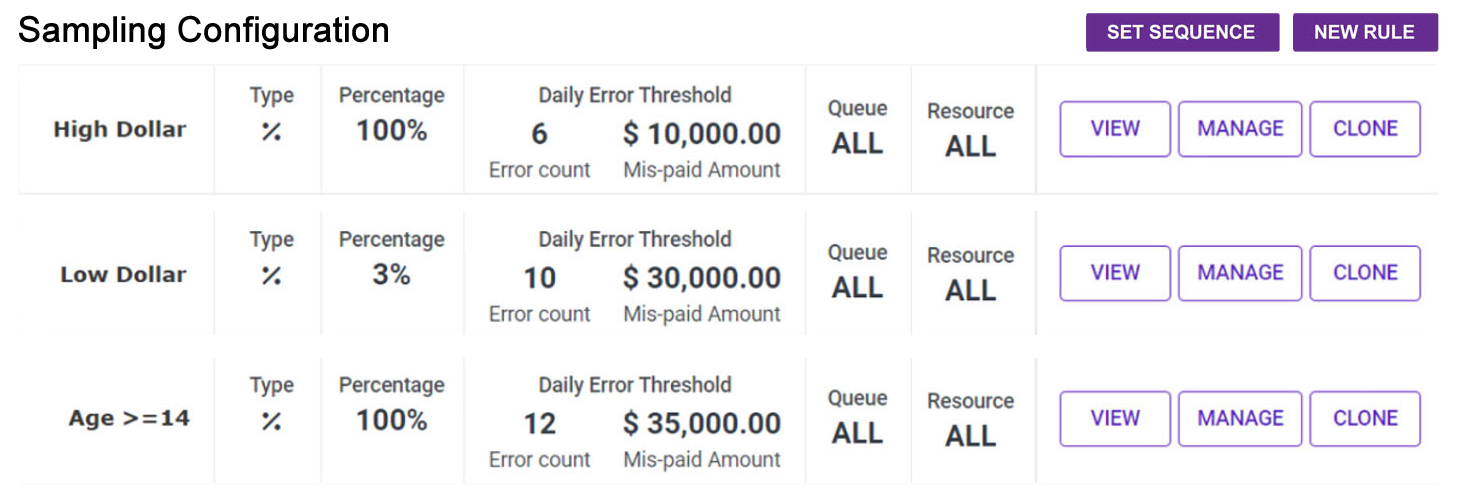
Training Need Analysis
InsightPro uses a forward-thinking methodology that accurately identifies training requirements through the in-depth analysis of quality data to detect trends and patterns.
Learn more

User Management
InsightPro gives quality managers granular control over who can access their quality management system and what level of permissions they possess.
Learn more
User Management
Through this user and access management, only authorized personnel can access sensitive quality-related data and perform relevant tasks. By assigning access rights based on roles and responsibilities, the system maintains security and confidentiality while allowing team members to contribute effectively.
Work Distribution
InsightPro employs a quality-centric strategy that seamlessly integrates AI/ML capabilities with a customizable rules engine for efficient work distribution.
Learn more
Work Distribution
The rules engine can be customized to allocate quality samples to auditors, considering factors like experience, line of business, dollar amounts, and other relevant parameters. Our rules engine can also be continuously refined and updated to reflect changing quality priorities and objectives. This rule-based work distribution approach enhances efficiency, productivity, and the precision of audits.
